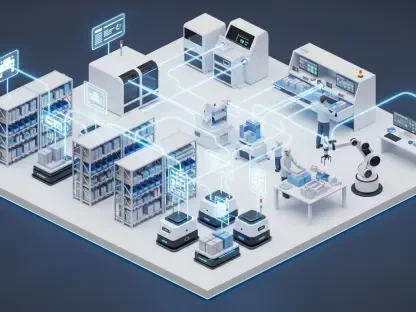Smart contracts, powered by blockchain technology, are revolutionizing the way supply chains operate globally. This innovation addresses key issues of transparency, efficiency, and automation, promising solutions to longstanding challenges in supply chain management.
Modernizing Procurement & Supplier Agreements
Automated Financial Transactions
The introduction of smart contracts in procurement processes has changed the game by enabling automated financial transactions, ensuring that funds are released only when specific conditions like shipment arrival and inspection are met. The reliance on predefined conditions allows for a seamless and error-free transaction, removing the need for constant manual checks. Additionally, smart contracts utilize multi-signature wallets, which further enhance security by holding funds in escrow until both parties approve the transaction. This ensures that the risk of fraud is minimized, as both parties need to sign off on the transaction before any funds are moved.
By utilizing automated payments, smart contracts significantly reduce the delays and discrepancies that have traditionally plagued procurement processes. Manual verifications and third-party intermediaries often led to bottlenecks, resulting in delayed payments and mistrust between suppliers and buyers. Smart contracts eliminate these issues by automating the entire financial transaction, thus ensuring timely payments that are contingent upon meeting specific contract terms. The integration of automated payments into the procurement process not only speeds up the transaction time but also fosters a level of trust that was previously difficult to achieve in traditional supply chains.
Real-Time Dynamic Pricing
Smart contracts are also enabling real-time dynamic pricing as they utilize real-time data from decentralized oracles to adjust contract terms based on current market prices or demand fluctuations. This dynamic approach helps mitigate the risks of price volatility in supply chains by ensuring that prices are always aligned with the market conditions. Traditional contracts often found themselves embroiled in disputes due to price changes that occurred after the contract was signed. Smart contracts, however, dynamically adjust to these changes, ensuring that all parties receive fair market value for goods and services.
This revolutionizes supplier agreements, especially in industries where prices can fluctuate wildly over short periods. For example, in the agricultural sector, market prices can be affected by numerous factors like weather changes, transportation delays, and even political instability. Smart contracts instantaneously adapt to these changes, ensuring that contracts remain fair and reflective of the current market situation. This not only benefits suppliers by ensuring they receive current market prices but also provides buyers with updated and competitive pricing, thus enabling more accurate financial planning and budgeting.
Enhancing Logistics & Shipment Tracking
IoT-Enabled Smart Tracking
One of the most revolutionary aspects of smart contracts in the supply chain industry is the use of IoT-enabled smart tracking. By leveraging the Internet of Things (IoT) devices, smart contracts can monitor shipping containers in real-time, capturing valuable data such as GPS location, temperature, and humidity. This data is then securely stored on a blockchain, ensuring that all stakeholders have access to accurate, up-to-date information. By providing end-to-end visibility, smart contracts drastically reduce uncertainties and inefficiencies that have traditionally hampered logistics and shipment tracking.
The data collected through IoT devices is incredibly valuable for ensuring the integrity and quality of shipments, especially for perishable goods like food and pharmaceuticals. For instance, if the temperature of a refrigerated container deviates from its required range, the IoT sensors can immediately record this anomaly and trigger predefined actions in the smart contract. This could include notifying relevant parties or even halting the transit if necessary, thus preventing potential losses due to spoilage. By integrating real-time tracking and data recording, smart contracts offer an unprecedented level of transparency and trust in logistics operations.
NFT-Based Verification and Dispute Resolution
Another innovative application of smart contracts in logistics is the use of Non-Fungible Tokens (NFTs) for verification and dispute resolution. Each shipment is tokenized as an NFT, serving as a unique digital certificate that verifies the authenticity and ownership of the shipment. This tokenization process ensures that there is a permanent, tamper-proof record of the shipment on the blockchain. In case of disputes, smart contracts can trigger automatic insurance claims or refunds based on the predefined conditions, thereby streamlining the resolution process without the need for manual intervention.
The incorporation of NFTs into shipment tracking offers numerous advantages, particularly in terms of reducing fraud and counterfeiting. In industries like luxury goods and pharmaceuticals, where authenticity is paramount, using NFTs to verify shipments ensures that the products received are genuine and have not been tampered with. When a dispute arises, the smart contract can easily refer to the immutable records stored on the blockchain to establish the root cause and automatically execute the necessary actions, such as refunding payments or initiating insurance claims. By providing a clear and transparent method for dispute resolution, smart contracts add another layer of security and efficiency to the logistics process.
Optimizing Inventory & Warehouse Management
Automated Orders and AI Forecasting
Smart contracts are also transforming inventory and warehouse management by automating orders and implementing AI-driven forecasting. When inventory levels drop below a certain threshold, smart contracts automatically trigger new orders to replenish stock. This automated replenishment system ensures that businesses maintain optimal inventory levels, reducing the risk of overstocking or stockouts. AI-driven demand forecasting enhances this process by analyzing past sales data and identifying trends to predict future demand more accurately, thus ensuring that inventory levels are always in sync with market requirements.
This level of automation and forecasting is a significant leap forward from traditional inventory management systems, which often rely on manual input and are prone to human error. By employing AI algorithms, smart contracts can continuously monitor inventory levels and forecast future needs based on a wide range of variables, including seasonality, market trends, and consumer behavior. This not only reduces the administrative burden on warehouse managers but also improves overall operational efficiency and customer satisfaction. With smart contracts, businesses can ensure that their inventory levels are always optimal, thereby avoiding costly disruptions and ensuring the timely fulfillment of customer orders.
Decentralized Autonomous Warehouse Management
The use of smart contracts in inventory management extends beyond automated orders and AI forecasting. Warehouses can be managed by Decentralized Autonomous Organizations (DAOs), which operate based on self-governing smart contract rules. These DAOs significantly reduce administrative overhead by automating various aspects of warehouse management, such as inventory tracking, order fulfillment, and maintenance scheduling. By removing the reliance on human intermediaries, DAOs streamline operations and improve overall efficiency, allowing businesses to focus on more strategic activities.
In a traditional warehouse setting, numerous employees are often required to manage and coordinate different aspects of operations. This can lead to inefficiencies, miscommunications, and unnecessary costs. By implementing DAOs for warehouse management, businesses can automate routine tasks and ensure that operations are always carried out according to predefined rules. This not only reduces the need for manual intervention but also minimizes the risk of human error and improves overall operational efficiency. By decentralizing warehouse management through smart contracts, businesses can achieve higher levels of transparency, accuracy, and cost savings.
Facilitating Cross-Border Trade & Customs Compliance
Seamless Customs Processing
One of the most complex and time-consuming aspects of international trade is customs compliance. Smart contracts facilitate automated customs declarations by verifying duties, VAT payments, and tariff classifications in real-time. This automation accelerates cross-border transactions and minimizes delays, allowing shipments to move through customs more quickly and with fewer complications. By ensuring that all customs-related activities are handled automatically, smart contracts help businesses navigate the complexities of international trade with ease.
Smart contracts achieve this by integrating with various customs and regulatory systems, providing real-time verification of all necessary documentation and payments. This not only streamlines the customs process but also ensures compliance with international trade regulations. Traditional customs processing often involves significant paperwork and numerous intermediaries, leading to delays and increased costs. By automating these processes, smart contracts reduce the administrative burden on businesses and customs authorities alike. This leads to faster processing times, reduced errors, and ultimately more efficient cross-border trade operations.
Confidential Trade Compliance
Confidential trade compliance is another critical aspect of international trade that is enhanced by smart contracts. Using Zero-Knowledge Proofs, businesses can prove compliance with international trade regulations without exposing sensitive commercial data. This ensures that businesses can maintain privacy and security while still meeting all regulatory requirements. Zero-Knowledge Proofs allow parties to verify the accuracy of information without revealing the actual data, thus protecting sensitive business information from potential exposure.
This level of privacy is particularly important in industries where proprietary information or sensitive commercial data must be protected. For example, companies dealing with intellectual property or high-value goods need to ensure that their trade activities comply with regulations while keeping their business information confidential. Smart contracts, through the use of privacy-preserving cryptographic techniques, offer a secure and efficient way to achieve this balance. By ensuring that trade compliance can be verified without compromising sensitive data, smart contracts provide an added layer of security and trust in cross-border trade.
Leading Providers and Development Tools
Key Innovators in Smart Contract Solutions
Several key players are leading the way in developing and implementing smart contract solutions for supply chains, providing the technology backbone required for these innovations. IBM’s TradeLens, for instance, is a blockchain-based platform designed to facilitate global trade by providing end-to-end supply chain visibility. VeChain, another prominent player, utilizes blockchain technology to enhance supply chain transparency and traceability, offering solutions that improve product lifecycle management from manufacturer to consumer. SAP Blockchain, part of the broader SAP ecosystem, integrates with existing business processes to streamline supply chain operations using smart contracts and IoT technology.
Platforms such as Hyperledger Fabric and the Ethereum Foundation offer the foundational technology that enables the development of smart contract solutions. Hyperledger Fabric, an open-source enterprise-grade blockchain framework, provides modular architecture and features designed for private and confidential transactions. The Ethereum Foundation, on the other hand, supports the development of decentralized applications (dApps) using smart contracts on the Ethereum blockchain. These platforms empower developers to create custom solutions tailored to specific supply chain needs, ensuring that businesses can leverage blockchain technology effectively to enhance their operations.
Supporting Tools and Protocols
Smart contracts, leveraging blockchain technology, are transforming the global supply chain landscape. This innovative approach proactively addresses critical issues in the sector, such as transparency, efficiency, and automation. Blockchain-enabled smart contracts foster greater transparency by providing an immutable record that all participants in the supply chain can access. This ensures that every transaction and change is visible, reducing the risk of fraud and errors. Additionally, smart contracts enhance efficiency by automating processes that traditionally required manual intervention. For instance, payments, order approvals, and shipment tracking can be executed automatically once predefined conditions are met. This automation reduces delays, lowers costs, and minimizes human error. Overall, smart contracts hold the potential to solve long-standing challenges in supply chain management by improving reliability, speeding up operations, and boosting overall trust among stakeholders.









